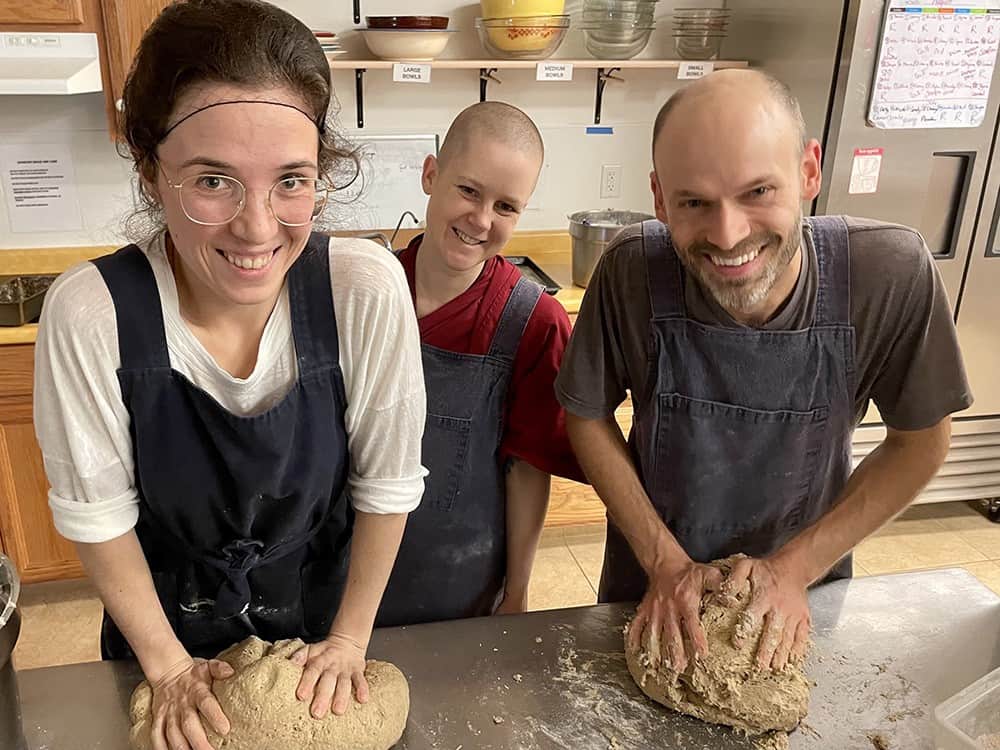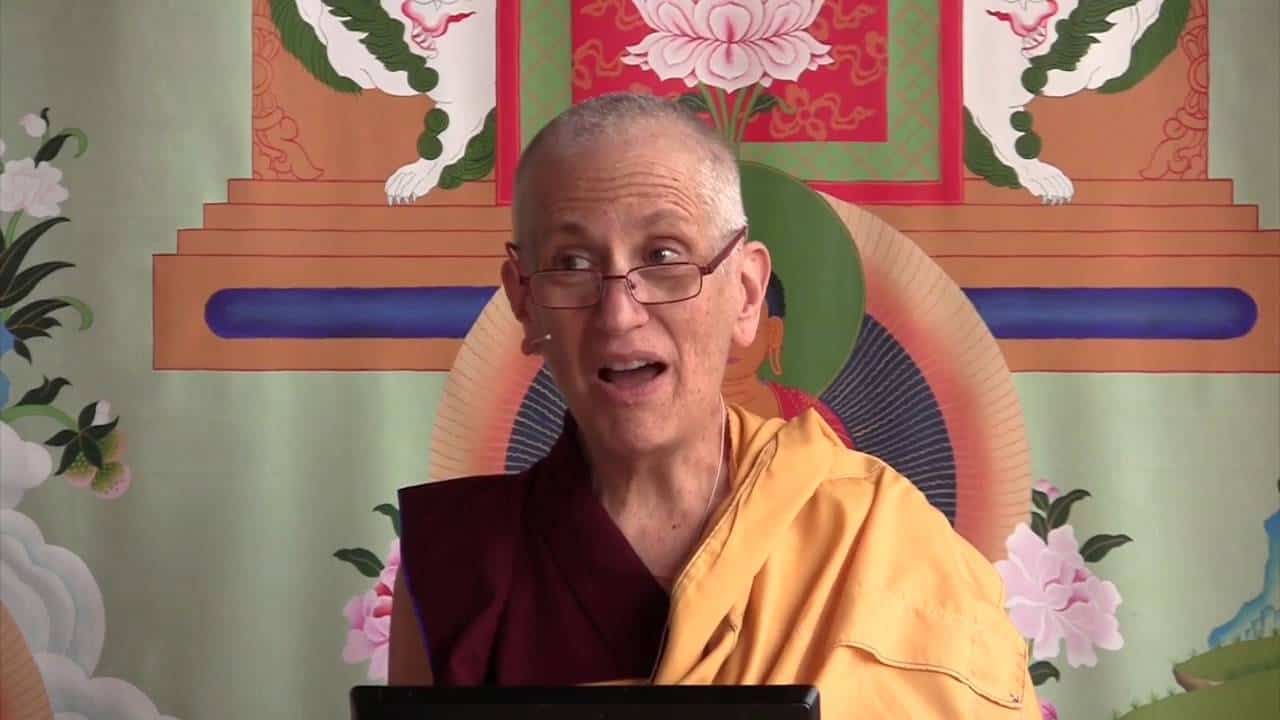The heart connection between monastics and laypeople
Part of a series of short talks about the meaning and purpose of the food offering prayers that are recited daily at Sravasti Abbey.
- Verses for laypeople who offer food to nourish the sangha
- Verses for the sangha who in turn nourishes the laypeople with teachings
I wanted to make one more comment about yesterday’s talk, when I was talking about going on pindapata as the monastics did at the time of the Buddha. Pindapata, or alms round, was what all the ascetics did at the time of the Buddha. There were many different ascetic groups and they all tried to live a simple lifestyle, be renunciants, and so they would go in the village during the day and people would make offerings to them of food. The Buddha, of course, being a wandering renunciant set up the sangha in the same way.
It has a special meaning. The meaning we can duplicate here, as I was talking about yesterday, going on pindapata doesn’t work so well in the US. Although, maybe we can get a parade permit and then go do it like our friends at Shasta Abbey. But what it does is it sets up this relationship of dependency between the sangha and the lay community. The lay community would give food, and the sangha would give teachings. Sometimes the sangha would just wander, go to the village and collect alms, go back to the monastery and eat. Sometimes lay supporters would bring prepared food to the monastery.
The monasteries didn’t really appear until much later. Aside from the three months of varsa, they didn’t really have settled monasteries until after the Buddha’s passing. But during varsa they certainly brought food to the monasteries.They offered food in the towns. And then some people would invite the entire sangha or a certain number of sangha members to come to their home and offer a meal that way. Whenever that happened, then after the meal that sangha would give a teaching. It was this beautiful kind of interchange of the economy of generosity, with the offering of the food and the offering of the Dharma, so that everybody in the situation benefits.
We try to duplicate that in a more modern context here at the Abbey. The lay community around us brings food to the Abbey. When people come for retreats then they bring food and it’s shared with everybody at the retreat. Then since we don’t have retreats and courses all the time, then there’s a group of very dedicated volunteers in Spokane and Coeur d’Allene and everywhere in between that calls us once a week, or so, and says, “What do you need?” Then when people request us and ask, “What do you need?” then we tell them. We never call them and say, “Please get us this and this.” So we don’t ask for it ourselves. But only reply to requests. And we tell them. And then they do the shopping and come and offer the food. And so we’ve made a Dharma practice out of this to really remind ourselves of the interdependent nature, so that everybody in the situation can create great merit through the offering.
Yesterday Tracy, one of our supporters in Spokane, asked me to talk about this and the different verses.
Originally we started it so that when people came and offered food they would recite a verse of offering and the sangha would recite a verse in response, and I composed these. Then the lay people requested, “Well, we want to make sure our mind is a Dharma mind when we go shopping for the groceries to start with, so please write something for that situation.” So then another verse was written. I’ll read these to you and just explain a little bit.
Here’s what the people do before they go shopping for the groceries when they’ve asked us what we need and we’ve responded, and then they go shopping. I should note, before saying this, is that this was the idea of the local supporters, and then what happened is other people and guests from far away said “we want to offer food too, but we don’t live near you.” So some people send us food. But then also because the packaging and the food itself is quite heavy, and it may get ruined in transport, then all the supporters set up this system whereby the people who live far away can offer money for food, the supporters take that money, purchase the food, and then bring it up here and offer it on behalf of the people some of whom live in other countries, other parts of the US. It’s really rather amazing. And especially considering when we started this at the very beginning I said the Abbey we weren’t going to buy any food, and people said, “You’re going to starve! You’re not going to survive. People are not going to go along with this.” And that hasn’t happened.
Here’s the verse that the donors recite, maybe in their car before they go into the market. It says:
Offering food sustains the lives of others. I delight in providing physical nourishment to the sangha knowing that their practice and the teachings they give as a result of it will nourish my heart and the hearts of many others. I will have a calm heart and mind while mindfully selecting appropriate items to offer, and will have a deep sense of satisfaction knowing that the sangha appreciates this offering. We have a heart connection, and together we will create peace in a chaotic world.
Then they purchase the food, bring it up here, and then when they get here we have a big alms bowl from Thailand, we take a portion of the food and put it in the alms bowl on a table, and then this is the verse that the people who are offering the food recite. And sometimes people will choke (up) when they’re offering this. They’re holding back tears:
With a mind that takes delight in giving I offer these requisites to the sangha and the community. Through my offering may they have the food they need to sustain their Dharma practice. They are genuine Dharma friends who encourage, support, and inspire me along the path. May they become realized practitioners and skilled teachers who will guide us on the path. I rejoice at creating great positive potential by offering to those intent on virtue, and dedicate this for the awakening of all sentient beings. Through my generosity may we all have conducive circumstances to develop heartfelt love, compassion, and altruism for each other, and to realize the ultimate nature of reality.
It’s really emphasizing that we’re all in this boat together and we help each other, and that people are making a food offering out of a mind of real altruism and generosity without holding back, and that they see the value of the sangha community in preserving and spreading the teachings.
After they say that, then the sangha community who’s gathered also recites a verse, and we recite,
Your generosity is inspiring and we are humbled by your faith in the Three Jewels. We will endeavor to keep our precepts as best as we can, to live simply, to cultivate equanimity, love, compassion, and joy, and to realize the ultimate nature so that we can repay your kindness in sustaining our lives. Although we are not perfect we will do our best to be worthy of your offering. Together we will create peace in a chaotic world.
Again, emphasizing how we’re working together to create peace in a very chaotic world. And this verse that the sangha recites is reminding ourselves that we’re eating due to the kindness of other people, and that therefore we should hold our precepts as best as we can. We should study, and practice, and meditate, and then share the Dharma with others so that we can repay their kindness, because without their kindness our lives would not be sustained.
And then a reminder to the lay people that we are not perfect, because sometimes people say, “Oh, you’re wearing robes? You’re perfect. You never make mistakes.” No, we’re not, but we’re trying and we’re very committed to working on our minds.
So that’s how the whole thing of offering and receiving the offering of food works at the Abbey. We’ve been doing this since 2003, or perhaps it was 2004 that we started. The system has been in place since ’03. It was quite remarkable when we first moved in. I had driven up from Boise with somebody and we walked into the house, and people had cleaned the house, there were towels in the bathroom, there was food in the kitchen; it was really quite amazing to walk in and find all this hospitality. So, we’re very grateful, and thank you.
Venerable Thubten Chodron
Venerable Chodron emphasizes the practical application of Buddha’s teachings in our daily lives and is especially skilled at explaining them in ways easily understood and practiced by Westerners. She is well known for her warm, humorous, and lucid teachings. She was ordained as a Buddhist nun in 1977 by Kyabje Ling Rinpoche in Dharamsala, India, and in 1986 she received bhikshuni (full) ordination in Taiwan. Read her full bio.


